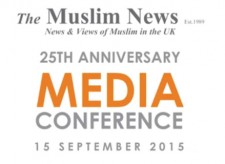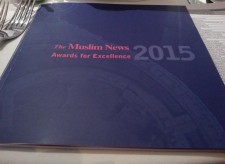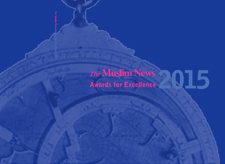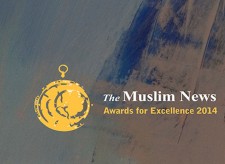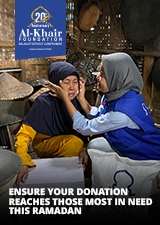Noori Husain and her coach Bec, winning the annual introductory dressage shield in May 2019. (Courtesy of Chalfont Heights Riding Club)
Noori Husain is a 26-year-old junior doctor who has worked for the NHS and is currently working in New Zealand. She has been an avid equestrian since childhood and is passionate about encouraging young Muslims to try riding. She was recently featured in Horse and Hound magazine on encouraging equestrian sports in minority ethnic groups. She has competed at a local level in Buckinghamshire and is currently enjoying new equestrian experiences in New Zealand.
Her other interests include art, history and languages. Noori has previously had a series of paintings exhibited in Moorfields Eye Hospital, London, and this series is currently on display in the Singapore National Eye Centre. Her medical interests include mental health, and she is currently working as a Psychiatry registrar in New Zealand.
How and when did your passion for equestrianism begin?
My passion for horses and riding started at a young age. I had a subscription to Pony magazine and I loved sticking all the posters up on my bedroom walls in Sanderstead, Surrey. I learnt to ride at small local stables in the Surrey Hills, which my mum used to drive me to every Sunday.
I learnt to ride on a small Shetland pony and then moved up. The memories are so vivid, I can still remember some of the falls I had a landing on the sandy arena floor, wearing my riding gloves with different coloured fingertips, and getting scared of a caterpillar that landed on my saddle when we were out hacking in the countryside.
How hard is it to juggle working as a junior doctor and horse riding?
It was, sometimes, difficult to juggle between work, riding and family time, particularly when I first started as a foundation year. One junior doctor and I would ride after work and on weekends. I think it helped me release the pressures of the day and be a better doctor by allowing me to recharge in a natural environment.
I also find being around horses very healing, and in particular, the horse that I shared for three years, ‘Joy’, as she has such a sweet and kind temperament and is always willing to go on an adventure with me. Moments such as competing during the Holy Month of Ramadan as well as post night shift stand out to me – I am so glad that I chose to follow my passion rather than go to bed! I distinctly recall trying to memorise a dressage test while taking a break on a night shift, walking in a pattern around the doctor’s mess, which I hope nobody saw as it would have looked odd.
How has your experience been in New Zealand?
I moved to New Zealand in September 2020, and I have been working in a mental health department in a hospital here. Living in New Zealand has given me a whole new equestrian world to explore.
This experience has been incredible, I have had the opportunity to learn natural horsemanship skills, ride in amazing locations such as on mountains and through rivers and even do multi-day horse treks across sacred Māori cultural land (Māori are the indigenous people of New Zealand). It’s also been fascinating to ride in a different sort of style from what I am used to, including not only the saddle and reins but also the breeds of the horse too.
You volunteered for the Riding for the Disabled Association, during your student years, what was that like?
I remember having my orientation evening at the South Bucks Riding for the Disabled Association; it was actually Eid day and I had just got a car, so I was excited to drive myself to the stables and learn what my duties would be.
I wanted to be around horses, and during medical school, it felt extravagant to be spending money on lessons, especially while renting a place in London. I learnt a lot at the RDA, and I met many really dedicated and amazing people. It was a grounding experience, and it’s very humbling to see a child that normally uses a wheelchair look so capable and happy on the back of a horse.
Horse riding is seen as an expensive and elitist sport, what do you think needs to be done to shed that image?
I think it does come down to your personal beliefs and experiences. I avoid thinking about what other people are thinking of me, and just enjoy where I am.
For example, I often go with my mum to equestrian events such as London Olympia (an annual horse show), the Royal Windsor Horse Show and cross-country events such as Blenheim. Sometimes people do look at us as we both wear hijab, but we are both confident about ourselves and love horses, so we just smile and people are generally quite nice. It is probably just a natural response, I do not think it is unkind; it’s like seeing something new. I think people should pursue their passions and not think about how they look, as you only end up regretting the things that you do not try.
Why do you think so few Muslim and ethnic minorities take up riding, and what advice do you have for anyone from those communities interested in horse riding?
There are more, and more opportunities becoming available for young people to learn to ride. Ladies such as Khadijah Mellah are so inspiring, and I am excited for the future of Muslim women in sports around the world. Horse-riding is such a rewarding pastime in so many ways because you’re interacting with another living being that God has created, and every ride is different. It is a sport that is recommended Islamically, along with swimming and archery.
Riding forces you to look outside yourself and notice the world around you.
You also can’t use your phone or focus on anything else, and the connection you can build with a horse is really special. Galloping at full speed is just a feeling like nothing else for me, it’s such a pure and freeing experience where you are very present. Horses are also very sensitive to your feelings and emotions. They can easily pick up if you’re feeling anxious or worried, and so learning to control your feelings is a key part of riding, this is something that has been an invaluable skill for me as a doctor.
What type of riding do you do, and what does it entail?
Before moving to New Zealand, I competed in local shows for our riding club, Chalfont Heights. Our club is affiliated with British Riding Clubs, which is part of the British Horse Society, this allows us to compete against other riding clubs in our area in different disciplines throughout the year. Sometimes if a team does well, they are eligible to compete at various championships throughout the country.
I take part and enjoy competitions for my sense of achievement in sport and to make my team and my family proud, not as a professional rider. I have mainly competed in dressage and showing as part of the senior team for our club, and a bit of showjumping. Sometimes people are not aware that there are multiple disciplines in equestrian sport, not only racing, which is what may first spring to mind.
For a dressage competition, the process would involve, first, submitting an entry and practising for the upcoming show – you would choose which classes to enter and the specific dressage tests. Each test is around four minutes long and is a series of movements such as riding down the centre line, doing circles and half circles and diagonals as well as different paces (walk, trot and canter). They are graded from introductory, preliminary and novice (which are the most commonly performed ones at a non-professional level) through to higher grades, such as Grand Prix, which is seen at the Olympics.
The test is read out or memorised. Scores are based on the quality of each movement, smoothness of transitions and collective marks for aspects such as freedom, regularity, forward momentum, balance, lightness, the rider’s position and correctness and effectiveness of the aids. These are all marked by a judge who sits at the front of the arena and watches the test.
At our yard, the day before the show was when we would get the horses ready. This involved cleaning all the tack (saddle and bridle) as well as washing the horses and plaiting their manes. Then I would go home, shine my boots and maybe, do a last-minute wash of the white show shirt and jodhpurs [riding pants] before taking the show jacket out of the wardrobe, as well as the matching hijab of course.
The day of the show was always full of emotion and energy. It would involve an early start, changing into show clothes and wearing another layer on top and bottom to ensure that everything stays clean until the final moment. Then re-washing and brushing your horse (sometimes still in the dark, on a cold winter’s morning) and loading them onto the horse lorry with all their rugs and travel gear as well as hay for the day and water buckets.
Upon arriving at the show, everyone is in a rush to register and collect their number, unload the horses and get them ready. Then, you get yourself ready and enter a warm-up ring before being called for your test. You enter the arena and politely greet the judge, trotting around the edge of the arena until a bell is rung for you to start. At the end of your test, it is customary to ‘halt, immobility, salute’ – where you salute the judge before leaving the arena – this is my favourite part. After that, you can collect your dressage test score sheet and find out which aspects you have done well on and collect a rosette if you have been placed within the top six of the competing class.
The local community equestrian spirit is what motivates me and makes me feel part of something. When we have our local shows twice a year, everyone helps out to set up the jumps and arenas and put things away once all the horses, competitors and lorries have left.
Show days are just so special to me, everything from getting the horses ready and loading them to sitting in the lorry-reading test score sheets on the way back still in (now dirty) white jodhpurs and sharing snacks.
Times like those, when someone runs back to the group with a red rosette – things like appearance are so irrelevant, the energy is so happy and in the now. It’s not only the competitors that make the day so fun, it’s everyone that comes too, like Vicky (who owns Joy) and Bec, my coach. There have, of course, been tests that have gone wrong, dreadful weather and essential items forgotten on show day, but those are all part of the experience and a learning point every time.
How do people around you react to your hijab?
I have always been proud of my hijab, and it’s never stopped me from pursuing my passions. I have had nice comments from judges, who have complimented me on it as I entered the arena, and remembered me from previous shows, which is such a warm feeling.
I have also lost points for not having the correct attire, as officially you are meant to wear a ‘stock’, which is like a tie that goes at the front of your shirt, except I can’t seem to make it work with my hijab. Apart from that, my show attire has always been correct, and I have won a showing class before. Showing is a discipline where the focus is placed on appearance and the overall ‘look’ of the horse and rider.
Interview by Elham Asaad Buaras



